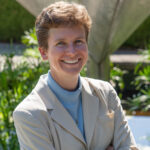Balancing Teaching and Research
Scholarship On Teaching - Topic: Balancing Teaching and Research - 3 results
Select an item by clicking its checkbox
Additional Info:
The following essay is based on an oral presentation, "On Being a Good Teacher and a Good Writer," which the author was asked to make for the Southwest Commission on Religious Studies, March 16, 2003. The purpose of the presentation was to encourage conversation among theological educators on the character of their vocation. A panel discussion of the theme followed the presentation. The presentation was designed to engage this subject at an ...
The following essay is based on an oral presentation, "On Being a Good Teacher and a Good Writer," which the author was asked to make for the Southwest Commission on Religious Studies, March 16, 2003. The purpose of the presentation was to encourage conversation among theological educators on the character of their vocation. A panel discussion of the theme followed the presentation. The presentation was designed to engage this subject at an ...
Additional Info:
The following essay is based on an oral presentation, "On Being a Good Teacher and a Good Writer," which the author was asked to make for the Southwest Commission on Religious Studies, March 16, 2003. The purpose of the presentation was to encourage conversation among theological educators on the character of their vocation. A panel discussion of the theme followed the presentation. The presentation was designed to engage this subject at an autobiographical and reflective level rather than as an academic argument. The published version of the essay seeks to retain something of the personal reflective character of the original presentation.
The following essay is based on an oral presentation, "On Being a Good Teacher and a Good Writer," which the author was asked to make for the Southwest Commission on Religious Studies, March 16, 2003. The purpose of the presentation was to encourage conversation among theological educators on the character of their vocation. A panel discussion of the theme followed the presentation. The presentation was designed to engage this subject at an autobiographical and reflective level rather than as an academic argument. The published version of the essay seeks to retain something of the personal reflective character of the original presentation.
Additional Info:
One might think that primary research in library and church archives would be a dry, lifeless endeavor, far removed from the present–day spiritual urgency that quickens the religious studies classroom. After all, archives raise the specter of musty tomes housed in dark, dank, and isolated basements. To the contrary, based on interviews with several students and teachers doing such research, this article maintains that primary archival research in religious ...
One might think that primary research in library and church archives would be a dry, lifeless endeavor, far removed from the present–day spiritual urgency that quickens the religious studies classroom. After all, archives raise the specter of musty tomes housed in dark, dank, and isolated basements. To the contrary, based on interviews with several students and teachers doing such research, this article maintains that primary archival research in religious ...
Additional Info:
One might think that primary research in library and church archives would be a dry, lifeless endeavor, far removed from the present–day spiritual urgency that quickens the religious studies classroom. After all, archives raise the specter of musty tomes housed in dark, dank, and isolated basements. To the contrary, based on interviews with several students and teachers doing such research, this article maintains that primary archival research in religious and theological studies is often experienced as empowering, connecting researchers to their subjects with an immediacy that secondary sources simply cannot provide. Diaries, letters, hymns, administrative reports, and church–school teaching notes are the sorts of documentary evidence and personal effects at issue, and these offer unexpected insights to researchers who brave the archives.
One might think that primary research in library and church archives would be a dry, lifeless endeavor, far removed from the present–day spiritual urgency that quickens the religious studies classroom. After all, archives raise the specter of musty tomes housed in dark, dank, and isolated basements. To the contrary, based on interviews with several students and teachers doing such research, this article maintains that primary archival research in religious and theological studies is often experienced as empowering, connecting researchers to their subjects with an immediacy that secondary sources simply cannot provide. Diaries, letters, hymns, administrative reports, and church–school teaching notes are the sorts of documentary evidence and personal effects at issue, and these offer unexpected insights to researchers who brave the archives.
Additional Info:
The author believes that the value of teaching in the academy will continue to be diminished as long as teaching and scholarship are viewed as separate and unequal. Thus, pedagogical proficiency is a fundamentally important component of religious and theological scholarship. Pedagogical skills allow scholars to be in dialogue with people outside of their content specialization and outside of the academy; therefore, they enable dialogue with the people of a ...
The author believes that the value of teaching in the academy will continue to be diminished as long as teaching and scholarship are viewed as separate and unequal. Thus, pedagogical proficiency is a fundamentally important component of religious and theological scholarship. Pedagogical skills allow scholars to be in dialogue with people outside of their content specialization and outside of the academy; therefore, they enable dialogue with the people of a ...
Additional Info:
The author believes that the value of teaching in the academy will continue to be diminished as long as teaching and scholarship are viewed as separate and unequal. Thus, pedagogical proficiency is a fundamentally important component of religious and theological scholarship. Pedagogical skills allow scholars to be in dialogue with people outside of their content specialization and outside of the academy; therefore, they enable dialogue with the people of a religious tradition who are not scholarly specialists, but who are the living community of the religious tradition. The article seeks first to articulate a clear understanding of teaching competency, drawing on the concept of pedagogical proficiency. The case is then made for the role of teaching in scholarly research and, finally, its specific role in religious and theological research, showing that research accountability to a living religious tradition necessarily demands teaching competency.
The author believes that the value of teaching in the academy will continue to be diminished as long as teaching and scholarship are viewed as separate and unequal. Thus, pedagogical proficiency is a fundamentally important component of religious and theological scholarship. Pedagogical skills allow scholars to be in dialogue with people outside of their content specialization and outside of the academy; therefore, they enable dialogue with the people of a religious tradition who are not scholarly specialists, but who are the living community of the religious tradition. The article seeks first to articulate a clear understanding of teaching competency, drawing on the concept of pedagogical proficiency. The case is then made for the role of teaching in scholarly research and, finally, its specific role in religious and theological research, showing that research accountability to a living religious tradition necessarily demands teaching competency.

